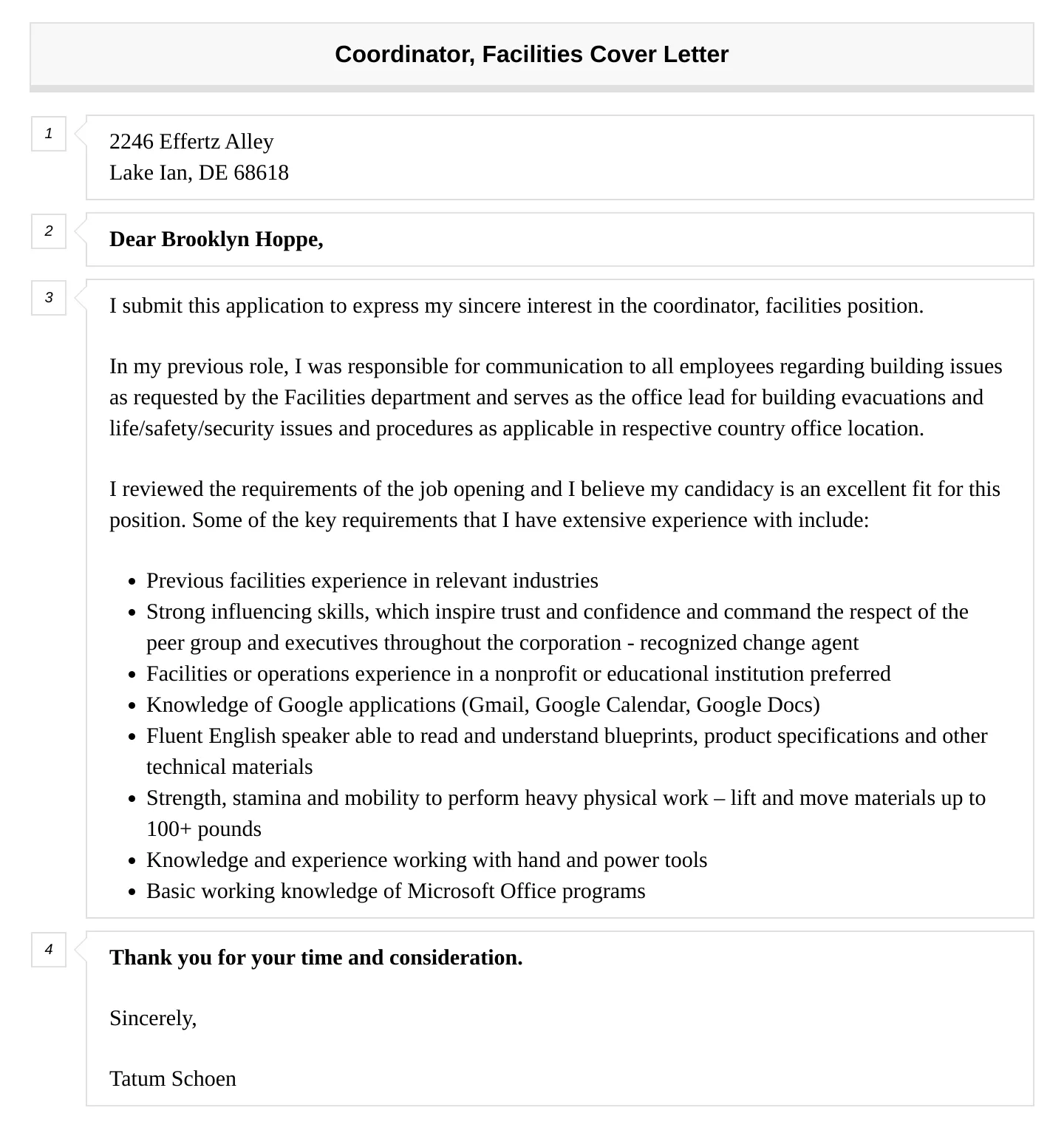Understanding the Importance of a Facilities Coordinator Cover Letter
A well-crafted facilities coordinator cover letter is your first opportunity to make a strong impression on a potential employer. It’s not just a formality; it’s a vital tool that showcases your qualifications, experience, and enthusiasm for the role. In a competitive job market, a compelling cover letter can set you apart from other applicants and increase your chances of landing an interview. It allows you to provide context to your resume, explaining how your skills and experiences align with the specific requirements of the facilities coordinator position. By highlighting your key achievements and demonstrating your understanding of the company’s needs, you can significantly improve your chances of getting noticed. Furthermore, a cover letter provides a platform to express your personality and passion for facilities management, which can be a deciding factor for hiring managers.
Why a Cover Letter is Crucial
Cover letters are crucial for a number of reasons. First, they allow you to personalize your application. While your resume provides a snapshot of your professional history, a cover letter allows you to tailor your message to the specific job and company. Second, it provides an opportunity to expand on your skills and experiences. You can delve deeper into your achievements, explaining the impact of your work and providing specific examples. Third, a cover letter demonstrates your communication skills. It shows the hiring manager your ability to write clearly, concisely, and persuasively. Finally, it allows you to express your enthusiasm for the role and the company. By showing genuine interest, you can make a positive impression and increase your chances of being considered for the position. A well-written cover letter can be the difference between getting an interview and being overlooked.
Highlighting Your Skills and Experience
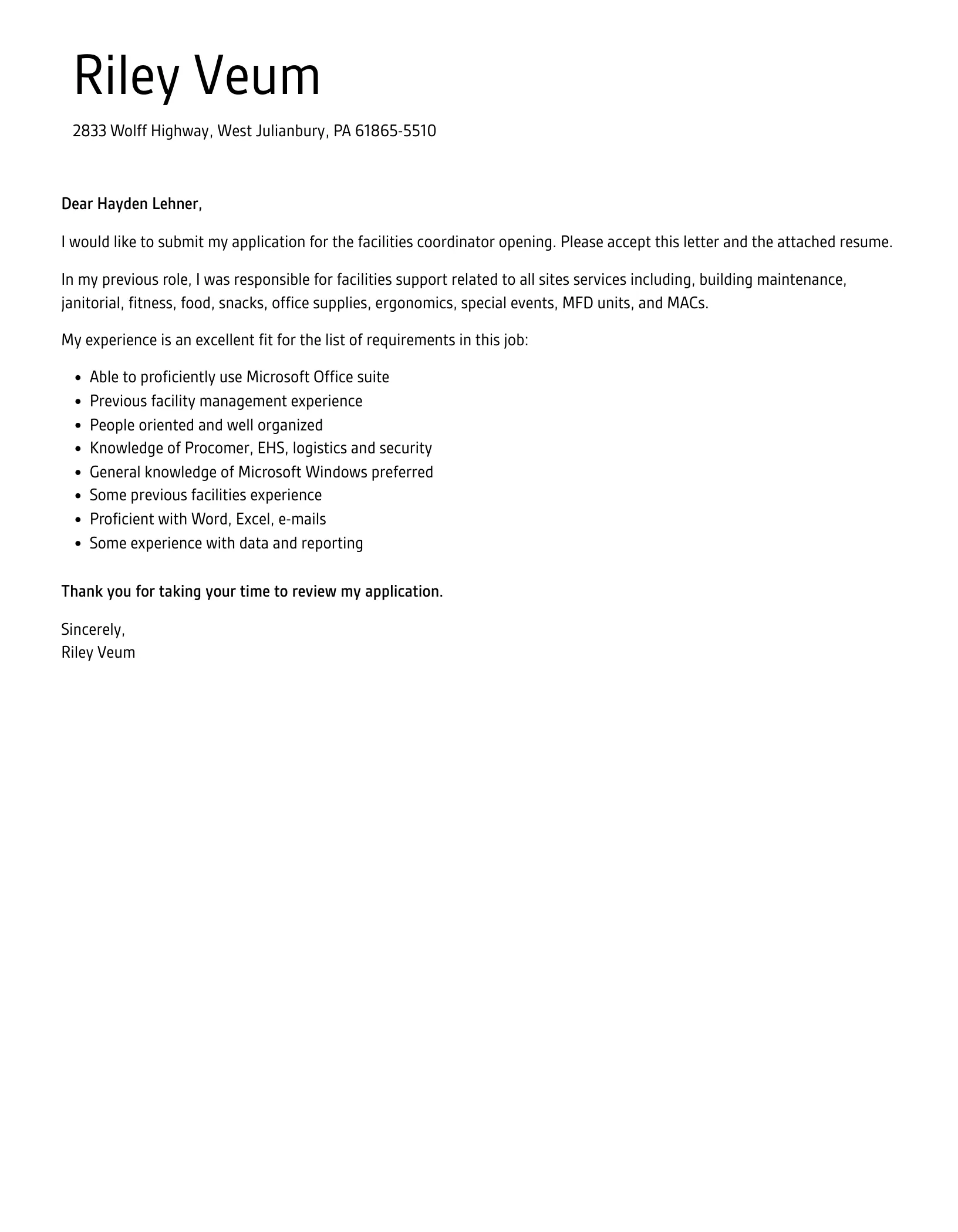
When crafting your cover letter, it’s essential to highlight your relevant skills and experience. Begin by carefully reviewing the job description and identifying the key requirements. Then, use your cover letter to showcase how your skills and experiences align with those requirements. Focus on the skills most relevant to the facilities coordinator role, such as project management, vendor management, maintenance coordination, and problem-solving. Provide specific examples of how you have used these skills in the past to achieve positive results. If you have experience managing budgets, coordinating maintenance schedules, or overseeing building projects, be sure to mention it. Demonstrate your ability to work independently, manage multiple tasks, and communicate effectively with stakeholders. The goal is to convince the hiring manager that you possess the skills and experience necessary to excel in the role of facilities coordinator.
Key Elements to Include in Your Cover Letter
Contact Information and Salutation
Start your cover letter with your contact information, including your name, phone number, email address, and LinkedIn profile URL (if you have one). Then, address the letter to the hiring manager, if possible. If you don’t know the hiring manager’s name, you can use a general salutation like “Dear Hiring Manager” or “Dear [Company Name] Hiring Team.” It’s always preferable to address the letter to a specific person, as it shows that you have taken the time to research the company and are genuinely interested in the opportunity. This personal touch can make a positive impression and increase your chances of getting noticed. Ensure your contact details are accurate and easy to read. Using a professional email address is also a good practice.
Crafting a Compelling Opening
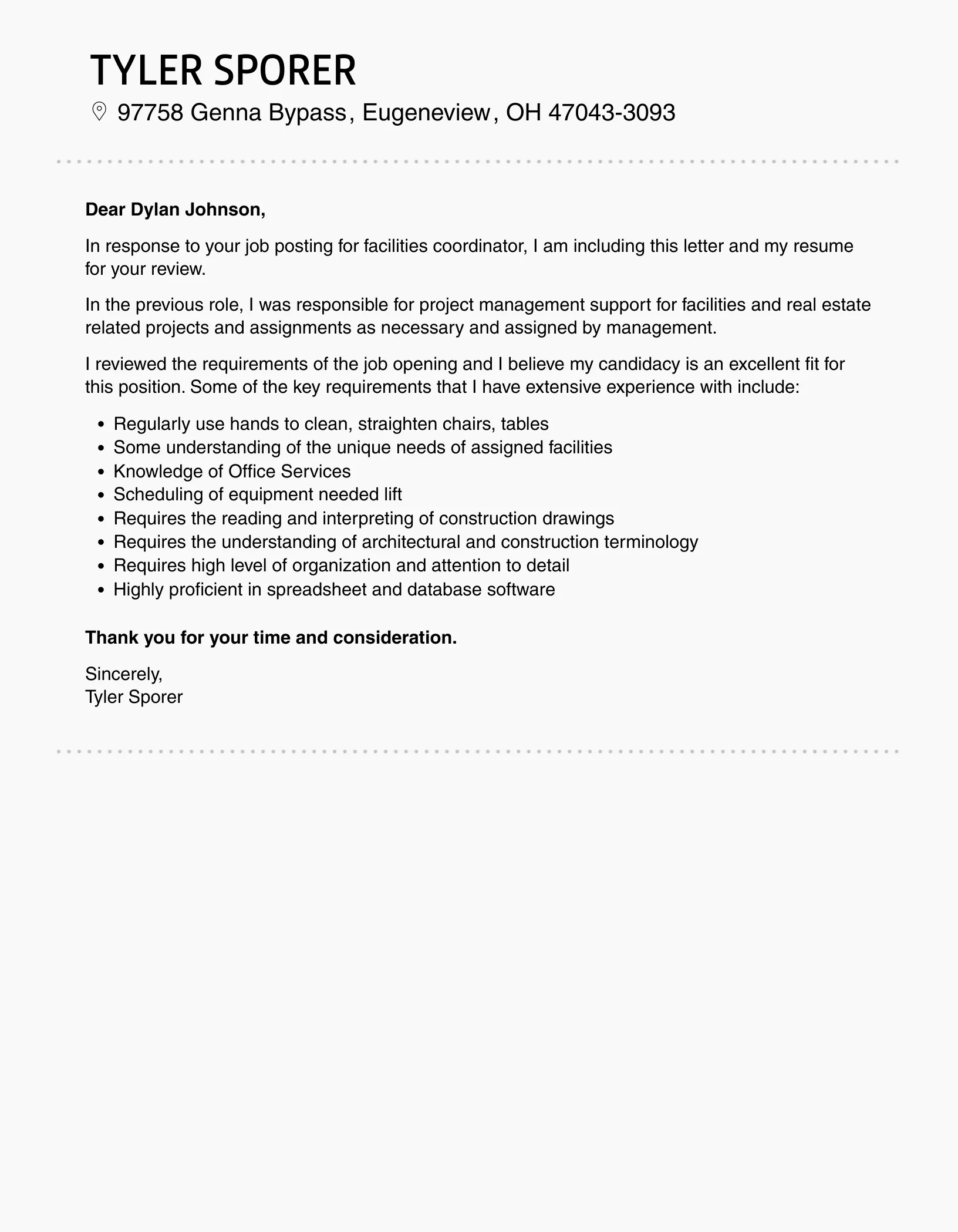
Your opening paragraph is your chance to grab the reader’s attention. Start with a strong hook that immediately conveys your interest in the position and the company. You can mention where you saw the job posting, briefly state your qualifications, and express your enthusiasm for the opportunity. Avoid generic opening lines. Instead, try to personalize your message by mentioning something specific that attracted you to the role or the company. For example, you could express your admiration for the company’s commitment to sustainability or its reputation for employee satisfaction. The goal is to make a positive first impression and encourage the hiring manager to read the rest of your cover letter. Be concise and focused, and avoid rambling or using overly formal language.
Showcasing Your Skills and Qualifications
The body of your cover letter should focus on showcasing your skills and qualifications. Refer back to the job description and identify the key requirements. Then, provide specific examples of how your skills and experiences align with those requirements. Use strong action verbs to describe your accomplishments and responsibilities. For example, instead of saying “responsible for managing vendors,” you could say “managed a portfolio of vendors, ensuring timely and cost-effective service delivery.” Quantify your achievements whenever possible. For example, you could mention the percentage by which you reduced maintenance costs or the number of projects you successfully completed. Tailor your cover letter to each specific job you apply for. Generic cover letters are less likely to impress hiring managers than those that are clearly written with the specific role in mind.
Quantifying Your Achievements
Quantifying your achievements is a critical aspect of a compelling cover letter. Numbers and data provide concrete evidence of your accomplishments and demonstrate your ability to deliver results. Whenever possible, use numbers to support your claims. For example, instead of saying you “improved efficiency,” you could say you “increased efficiency by 15% through process optimization.” If you managed a budget, state the size of the budget and the percentage by which you stayed within budget. If you were responsible for a project, mention the project’s scope, budget, and the timeline for completion. Quantifying your achievements adds credibility to your claims and makes your cover letter more persuasive. It also shows the hiring manager that you are results-oriented and focused on achieving measurable outcomes.
Demonstrating Your Passion for Facilities Management
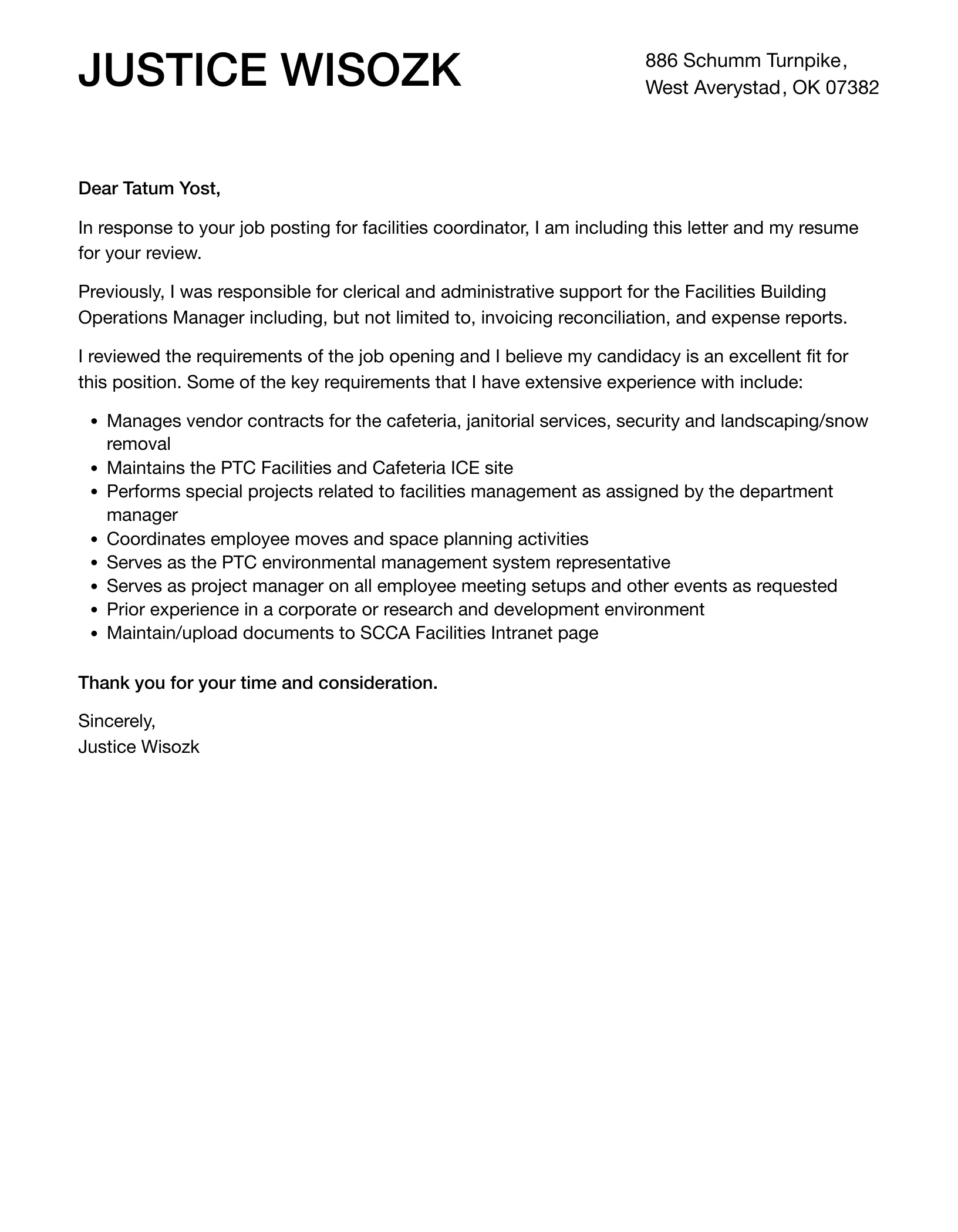
Expressing your passion for facilities management can significantly enhance your cover letter. Hiring managers want to know that you are genuinely interested in the role and the field. Show your enthusiasm by highlighting your understanding of the industry and your commitment to providing excellent service. You can mention specific aspects of facilities management that you enjoy, such as problem-solving, project management, or building maintenance. Talk about your desire to create a safe, efficient, and well-maintained work environment. If you have volunteered for facilities-related projects or have obtained relevant certifications, be sure to mention them. Expressing your passion will make your cover letter more engaging and memorable, and it can help you stand out from other applicants. Consider mentioning any professional development activities you’ve undertaken to show your dedication to the field.
Closing Your Cover Letter Effectively
Your closing paragraph should summarize your key qualifications and reiterate your interest in the position. Thank the hiring manager for their time and consideration. Express your enthusiasm for the opportunity and state that you look forward to hearing from them soon. Include a call to action, such as inviting the hiring manager to contact you for an interview. Be sure to proofread your closing paragraph carefully to avoid any errors. Keep the tone professional and enthusiastic. Avoid sounding desperate or overly familiar. By ending your cover letter on a positive and confident note, you can increase your chances of getting an interview.
Proofreading and Formatting Your Cover Letter
Common Mistakes to Avoid
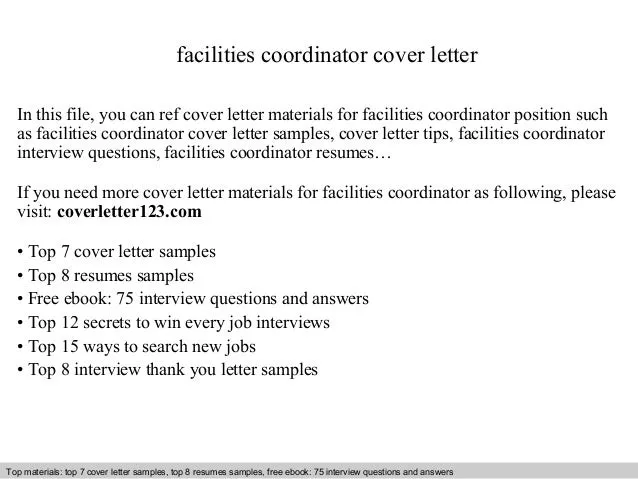
Avoid common mistakes such as typos, grammatical errors, and generic language. These errors can undermine your credibility and make a negative impression. Avoid using jargon or technical terms that the hiring manager may not understand. Do not exaggerate your qualifications or skills, as this can backfire during the interview process. Do not include irrelevant information or details that are not related to the job requirements. Avoid making negative comments about previous employers or colleagues. Do not send a cover letter that is too long; keep it concise and to the point. And finally, always tailor your cover letter to the specific job and company; generic cover letters are rarely effective.
Tips for Formatting
Use a professional and easy-to-read font, such as Arial or Times New Roman. Maintain consistent formatting throughout the document. Use clear headings and subheadings to organize your content. Keep the margins at 1 inch on all sides. Use single spacing for the body of the letter and double spacing between paragraphs. Proofread your cover letter carefully to ensure that it is free of errors. Save your cover letter as a PDF file to preserve its formatting and ensure that it can be opened by any hiring manager. Make sure the file name is professional, for instance, “FirstName_LastName_CoverLetter.” Always tailor the formatting to match the overall tone and branding of the company if you can.
